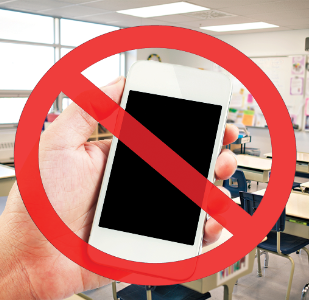On June 20, 2025, Texas House Bill 1481 took effect, banning all use of personal communication devices in school, including phones, smartwatches, and laptops. This law affected every school in Texas and has impacted every student, teacher, and administrator in how they function in school. Now, students are unable to use their phones during school hours, even during passing periods and lunch. Teachers must be stricter with monitoring students, and administrators have to enforce the new law with stern consequences.
Before House Bill 1481 took effect, Mansfield ISD allowed students to use their phones during lunch and passing periods, but now, any phone usage is banned on campus, during school hours. Junior Lily Sexton has noticed her classmates talking to each other more in class.
“Without their phones to distract them, kids can be a lot louder and a lot more boisterous, and it can be kind of distracting and annoying during class time. Because they’re talking to their friends, it makes learning and listening a lot harder in some cases,” Sexton said.
Students are not the only ones noticing the social affects of the phone ban. Assistant Principal Derek Odelusi has found himself talking with students more in the hallways.
“I’ve seen a big difference in the student body and how they act. Students talk to each other more when I go into observations. There’s more interaction. There’s more collaboration. There is even a dialogue with students now walking around in the hallways. I can’t have on headphones and just zone out and get to where I need to go. I have to be constantly alert and engaged,” Odelusi said.
Social life isn’t the only thing the phone ban has affected. The new law is more strict than MISD’s past phone policy, so students are unable to use their phones in school for any reason, even if it is academic. Senior Brendon Box is inconvenienced by this law, especially in his extracurriculars.
“I’m in theater, and a lot of the time we’ll use our phones to play tracks so that we can practice, but we can’t really do that now. Same thing with choir. If we wanted to play some tracks or pull up a virtual piano, you’re not really allowed to do that. There are a lot of utilities on your phone that are incredibly helpful to the learning environment that we no longer have access to,” Box said.
Extracurriculars are not the only thing troubled by the phone ban. Many classrooms used phones for their assignments, and Sexton wishes phones were still allowed for these activities.
“A lot of times phones are kind of used, not just as communication, but also as an education tool. So not having your phones during classes whenever you might need them for an activity or to look something up can be kind of difficult, especially if you have an assignment that requires you to record something or take a picture of something. They’re just overall helpful in education. So in certain classes, I’ve had to kind of use some different methods of doing things, and it would be a lot easier to have my phone,” Sexton said.
Some teachers have noticed a large change in their students’ involvement. AP English III teacher, Lisa Bonner, appreciates the phone ban for removing distractions from her class.
“It’s absolutely been 1,000% positive in terms of not having that distraction, and not just the phones, but also not having Air Pods and Beats. That’s really been positive. It’s really working out well for me, personally, as a teacher. I don’t know about what other teachers think, I think it’s so sad that we had to make it a law, but I think it’s a positive thing,” Bonner said.
Seniors are also uniquely affected by the phone law, with many having responsibilities outside of school, college activities, or academic prospects they need a communication device for. Box dislikes the inconvenience of communication without a phone.
“It’s a bit harder to communicate with people, because I’m involved in a lot of different stuff and doing a lot of different extracurriculars and academic stuff, and I can’t get information about stuff during the day without checking my email or my BAND app on my Chromebook, which takes extra effort. It’s a lot harder to get instantaneous notice about changes that might be like necessary information,” Box said.
Administrative faculty are seeing the changes incited by House Bill 1481 as they enforce the law. Odelusi handles dealing with administrative challenges that arise from students’ lack of phone privileges.
“There are times where we are used to students having a phone and they don’t have a phone, like maybe they need to scan a QR code to get an ID. Instead of doing that, we have to log in so that we can take their information. Sometimes it’s not as easy to log in. Sometimes there may easily end up being lines. For instance, we have the college day of testing coming up. We’re still trying to brainstorm how everyone is supposed to know about their testing rooms. We typically will send out a slip the day before, right? But the morning of, there’s a lot going on. Typically, you scan the QR code and you put in your ID number. It lets you know where you’re supposed to go. How do we do that if this is a policy that we have in place?” Odelusi said. “So it’s not that it’s impossible. It’s just causing us to rethink strategies that were very familiar for us, but it’s just one of them. Anytime something new happens, it’s uncomfortable until it’s comfortable.”
Another challenge from the new Texas state law is how teachers manage their students’ phone usage. Advanced English I teacher Amy Markan handles the new law with grace.
“There’s a couple of ways to handle it, you know. You can make a big fuss about it, or you can just remind your students, ‘Hey, this is a state policy, and this is how we’re going to handle it.’ And so, what’s imperative is making sure our kids are learning and just reminding them this is a new transition and this is how we’re handling it,” Markan said. “I think it also depends on the teacher’s approach. If someone’s aggressive and in your face and rude, then I think even the best person at heart is going to be combative and argue back, so I think it also depends on the adults perspective and how they approach it.”
Some Texans would like this law to change, and this culminated in a petition started by junior Cyliyah Goodlow, which now has over 150,000 signatures. Goodlow created this petition because the law felt unfair and misguided.
“I just felt like the bill was made for children, but it didn’t have a children’s say, or it could have been better regulated. And I just thought it was more about control rather than guidance, in a way,” Goodlow said.
With such an overarching bill, many aspects of student life are affected by this law. This petition was specifically inspired by Goodlow’s own experiences in the district with safety concerns and the lackluster responses from government officials.
“Before the bill was passed, I would email state representatives and the governor to see other things I could do for them to reconsider. But after the replies, I was just like, ‘I might as well make a petition,’” Goodlow said. “A lot of times there’ll be situations in the classroom where a teacher will be doing certain things and you wouldn’t necessarily know without the internet or social media, like when we had that false lockdown, and nobody really knew it was false. And they just told parents it was false way later, at 3 PM, and it happened at, I want to say, advisory. And nobody would have known [it was false] if it weren’t for students talking about it online.”
With such a new and influential law some people are wondering if there are better solutions to phone usage in school. Odelusi believes a different solution can’t be identified just yet.
“There might be [a better solution], but you need to create more data for that. You know, I’m a former biology teacher, so I’m big into the scientific method of: you have to go through a trial and then look at your results of your trial to see what new variable you can change to get a new result,” Odelusi said. “Ultimately, the goal of school is to maximize student learning, and if that is something that ends up being a result of this [law], then the lawmakers would have been in good standing to decide to do what they did, and I do believe that’s why they did what they did.”
With Texas banning personal communication devices in schools, many students, teachers, and administrators struggle to adapt. Since the ban, assignments, communication, and daily conveniences have changed, but the law isn’t entirely bad. Teachers and administrators noticed an increase in student participation and dialogue due to a lack of phones. Despite these positives, search for better solutions, with some even creating petitions to change the law. But, as nothing has been amended yet, people on school campuses must adjust to a phone-less school.


